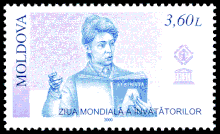Moldavská hymna
| Náš jazyk | |
|---|---|
 Alexei Mateevici, autor textu hymny | |
| Hymna | |
| Slova | Alexei Mateevici |
| Hudba | Alexandru Cristea |
| Přijata | 1994 |
|
Problémy s přehráváním? Nápověda.
| |
Limba noastră (česky: Náš jazyk) je státní hymnou Moldavské republiky. Státní hymnou Moldavské sovětské socialistické republiky byla od roku 1945 skladba Moldova sovietică/Молдова совиетикэ (česky: Sovětská Moldávie). Roku 1990 byla nahrazena skladbou Deșteaptă-te, române! (česky: Probuďte se, Rumuné!), která je zároveň hymnou Rumunska. V roce 1994 vstoupila v platnost současná hymna. Limba noastră je napsána romantickým stylem a vyzývá obyvatele Moldavska, aby oživili národní jazyk.
Slova napsal Alexei Mateevici (1888-1917) a hudbu složil Alexandru Cristea (1890-1942). Píseň obsahuje celkem 12 slok, jako hymna se používá 5 slok (označeny tučně).


Limba noastră
- Limba noastră-i o comoară
- În adîncuri înfundată
- Un șirag de piatră rară
- Pe moșie revărsată.
- Limba noastră-i foc ce arde
- Într-un neam, ce fără veste
- S-a trezit din somn de moarte
- Ca viteazul din poveste.
- Limba noastră-i numai cîntec,
- Doina dorurilor noastre,
- Roi de fulgere, ce spintec
- Nouri negri, zări albastre.
- Limba noastră-i graiul pîinii,
- Cînd de vînt se mișcă vara;
- In rostirea ei bătrînii
- Cu sudori sfințit-au țara.
- Limba noastră-i frunză verde,
- Zbuciumul din codrii veșnici,
- Nistrul lin, ce-n valuri pierde
- Ai luceferilor sfeșnici.
- Nu veți plînge-atunci amarnic,
- Că vi-i limba prea săracă,
- Și-ți vedea, cît îi de darnic
- Graiul țării noastre dragă.
- Limba noastră-i vechi izvoade.
- Povestiri din alte vremuri;
- Și citindu-le 'nșirate, -
- Te-nfiori adînc și tremuri.
- Limba noastră îi aleasă
- Să ridice slava-n ceruri,
- Să ne spuie-n hram și-acasă
- Veșnicele adevăruri.
- Limba noastra-i limbă sfîntă,
- Limba vechilor cazanii,
- Care-o plîng și care-o cîntă
- Pe la vatra lor țăranii.
- Înviați-vă dar graiul,
- Ruginit de multă vreme,
- Stergeți slinul, mucegaiul
- Al uitării 'n care geme.
- Strîngeți piatra lucitoare
- Ce din soare se aprinde -
- Și-ți avea în revărsare
- Un potop nou de cuvinte.
- Răsări-va o comoară
- În adîncuri înfundată,
- Un șirag de piatră rară
- Pe moșie revărsată.
Anglický překlad
- A treasure is our language that surges
- From deep shadows of the past,
- Chain of precious stones that scattered
- All over our ancient land.
- A burning flame is our language
- Amidst a people waking
- From a deathly sleep, no warning,
- Like the brave man of the stories.
- Our language is made of songs
- From our soul's deepest desires,
- Flash of lighting striking swiftly
- Through dark clouds and blue horizons.
- Our language is the language of bread
- When the winds blow through the summer,
- Uttered by our forefathers who
- Blessed the country through their labour.
- Our language is the greenest leaf
- Of the everlasting forests,
- Gentle river Nistru's ripples
- Hiding starlight bright and shining.
- Utter no more bitter cries now
- That your language is too poor,
- And you will see with what abundance
- Flow the words of our precious country.
- Our language is full of legends,
- Stories from the days of old.
- Reading one and then another
- Makes one shudder, tremble and moan.
- Our language is singled out
- To lift praises up to heaven,
- Uttering with constant fervour
- Truths that never cease to beckon.
- Our language is more than holy,
- Words of homilies of old
- Wept and sung perpetually
- In the homesteads of our folks.
- Resurrect now this our language,
- Rusted through the years that have passed,
- Wipe off filth and mould that gathered
- When forgotten through our land.
- Gather now the sparkling stone,
- Catching bright light from the sun.
- You will see the endless flooding
- Of new words that overflow.
- A treasure will spring up swiftly
- From deep shadows of the past,
- Chain of precious stones that scattered
- All over our ancient land.
Externí odkazy
 Obrázky, zvuky či videa k tématu Moldavská hymna na Wikimedia Commons
Obrázky, zvuky či videa k tématu Moldavská hymna na Wikimedia Commons - Státní hymna Moldavské republiky, TV Moldova, youtube.com
Reference
V tomto článku byl použit překlad textu z článku Limba noastră na anglické Wikipedii.
